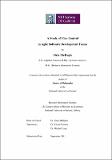| dc.description.abstract | Agile methodologies have become an accepted choice of methodology in the information systems development community in recent years, but few studies exist that examine control in teams that use such methodologies. This study draws on control theory to understand how agile practices facilitate the resultant characteristics of clan control in agile software development teams. The nature of agile software development encourages flexible and adaptable software development teams, who are provided with substantial control over how they work. However, research that examines this self-control is scant, with even less addressing clan control in such teams. As a result, agile software development teams have little understanding of whether and how clan control exists in their team, or the impact agile practices may have on various characteristics of clan control.
This study first derives a framework from the literature that presents conditions required for clans to develop, the pre-conditions that should be in place in order to implement clan control, and resultant characteristics that emerge as a consequence of implementing clan control. It then proposes that three agile practices (sprint planning meeting, daily scrum meeting, and sprint review and retrospective meeting) help agile software development teams to achieve the inter-linked, resultant characteristics of clan control detailed in the framework.
A qualitative approach was used for this study. Three exploratory case studies were conducted to examine the application of the conceptual framework to agile software development teams. The teams selected were similar in size, from different industry sectors, and varied in their distribution. Primary data was gathered through 25 structured interviews and 14 observations of the agile practices across three teams in two different countries. Data was analysed for each agile practice using the seven resultant characteristics detailed in the conceptual framework.
Results show that the three agile practices facilitated each of the resultant characteristics of clan control, either wholly or partially, which indicates that clan control is in operation in these teams. However, it cannot be assumed that these three practices are the only contributors to the characteristics of clan control. These findings will be of benefit to practitioners who lack knowledge in the area of clan control, or who are unaware of the impact agile practices may have on clan control within the team. Consequently, they may consider clan control as a suitable form of control in agile software development teams to supplement existing formal controls. Further studies should investigate the contribution of additional factors to clan control, such as other agile practices, the length of time the methodology was in use, the length of time individuals were employed by the organisation, the culture of the organisation, and the working environment.
One of the main contributions of this study is a framework that will guide future research on clan control. This is also a contribution to the management and control literature as this framework is not limited to agile software development and is suitable for application in many other areas. The study also adds to the current bodies of knowledge on clan control and agile software development.
The study concludes with recommendations for practitioners on how three agile practices studied can improve clan control in agile software development teams. These recommendations are made based solely on the findings from the teams studied and how these teams have implemented the agile practices. Future research can build on this to develop a more comprehensive set of recommendations. | en_US |


